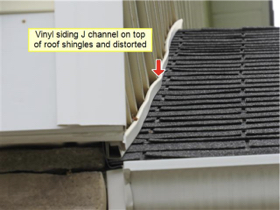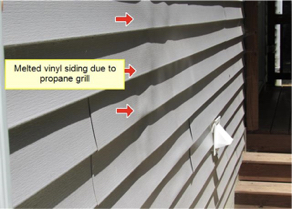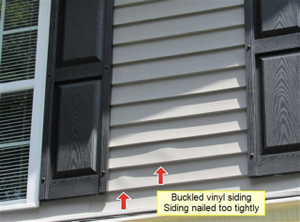3 Common Vinyl Siding Mistakes and How To Correct Them.
I inspected a home recently that had its vinyl siding installed incorrectly. As with any product, it must be installed according to the manufacturer’s instructions so that it will provide long lasting aesthatic pleasure and be covered under warranty. Some of the more common defects that I find with vinyl siding are improper clearance to roof materials, hot objects such as grills placed too closely, and siding improperly fastened.
Improper Clearance to Roof Materials
When vinyl siding is installed close to roof lines, a J channel is installed to accept and hold the siding in place. Vinyl siding manufacturers recommend installing the J channel with a minimum of ½ inch clearance above roofing materials so that heat from the roof is not transferred to the vinyl. If the clearance is not maintained, then the vinyl can melt and distort. In the picture below, the J channel was installed directly on the roof shingles causing the vinyl to bend and distort. Also, when your roof shingles need replacing, having the J channel directly on top can prove difficult in the removal of the roof shingles and step flashing.

Heat Damage
Placing very hot objects such as gas grills too close to the vinyl can lead to melting and distortion as can be seen in the picture below. Grills should be kept at a safe distance from the home when they are being used. Also, the Low E glass in newer home windows are great for energy efficiency but can reflect heat and sun in such a manner to cause melting and distortion of the vinyl.

Improper Fastening
Vinyl siding expands and contracts due to temperature changes, so clearances must be maintained at corner posts and other trim pieces such as doors and windows. A minimum of ¼ inch clearance should be maintained around trim pieces to allow for this movement. Also, the siding has nail slots to secure it to the home, and nails should not be driven in tightly to the siding. You should leave a 1/32 space between the head of the nail and the siding to allow the siding to move during expansion and contraction. If nailed too tightly, the siding can buckle as can be seen in the picture below.

Cleaning Your Vinyl Siding
When cleaning vinyl siding use an ordinary, long-handled car washing brush. This type of brush has soft bristles that will not scratch or damage the siding. Avoid using stiff bristle brushes or abrasive cleaners, which may change the gloss of the cleaned area and cause the siding to look splotchy. To remove most dirt, wipe down the siding with a solution made up of the following: 1/3 cup of powder laundry detergent such as Fab®, Tide®, and 2/3 cup powder household cleaner such as Soilax®, Spic & Span® or equivalent per one gallon of water. If mold or mildew is present, add 1-quart liquid laundry bleach to the solution. When washing the entire house, start at the bottom and work your way up to the top to prevent streaking.
Vinyl siding can offer years of enjoyment if it is installed and maintained correctly. An excellent resource for questions on installation and maintenance can be found at: https://www.vinylsiding.org/installation/installation-manual



